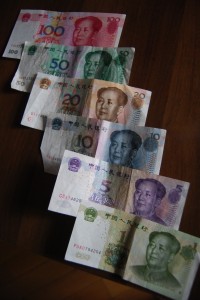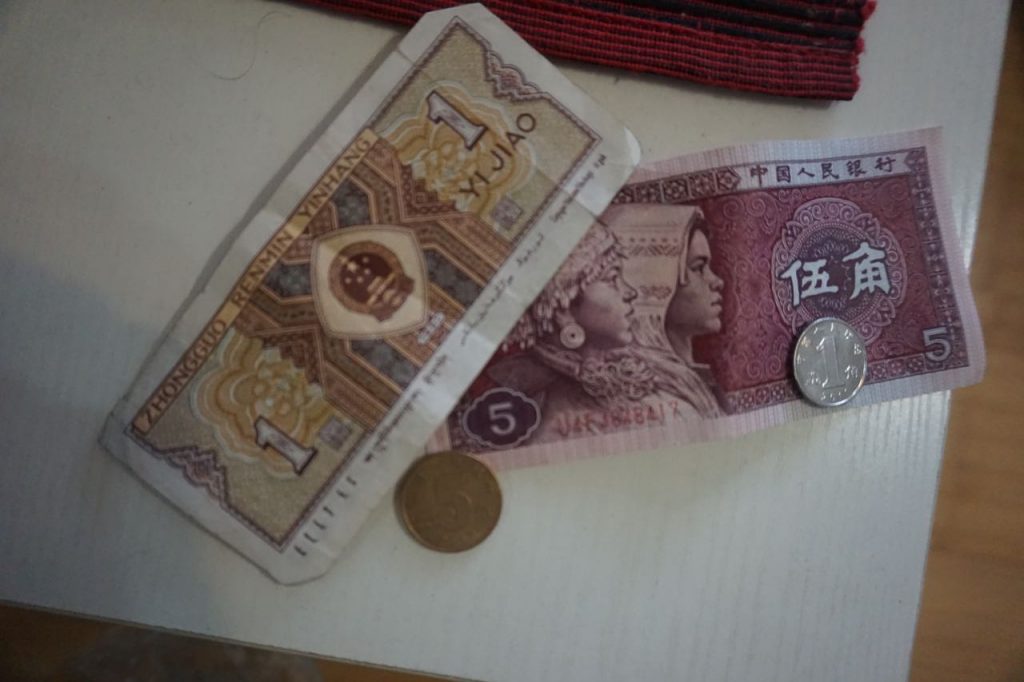Money Talks (in Chinese) Posted by sasha on Aug 13, 2015 in Uncategorized
There’s been a lot of talk about China’s currency – the RMB (renminbi) – in the past few days, as the People’s Bank of China allowed it to depreciate by 2% against the dollar. Do a brief search, and you’ll find tons of articles from financial publications all around the world speculating on the reasons for this move and the resulting effects it will have on not only China’s, but the entire global economy. This video from Bloomberg Business is a good crash course on the situation for those who haven’t been following:
As an English teacher, Chinese student, and freelance blogger, I’m not exactly qualified to be giving precise financial analysis. What I can do for you, however, is teach you how to talk about money in Chinese. Whether we like it or not, money plays a rather important role in our daily lives, especially when you move to another country and need to learn a bunch of new words just to complete your day-to-day business. In this post, I’ll give you the basics about China’s currency as well as a bunch of words/phrases you’ll need to handle daily financial matters in Chinese.
China’s Currency

All of the RMB notes in order.
As mentioned above, China’s currency is officially called the renminbi (人民币 – rén mín bì). This word can loosely be translated as the “people’s currency” – not a surprise in the People’s Republic of China. While RMB is the symbol you’ll see on exchange boards and in banks, people don’t generally use that word in daily life; rather, they say “yuan” (元 – yuán). It’s kind of like the difference between saying “USD” or just “dollars.” Another word that’s often used informally is kuai (块 – kuài), like how one might say “bucks” in the US or “quid” in the UK. The Chinese RMB is printed in 100, 50, 20, 10, 5, and 1 notes, all featuring Mao Zedong on the front and various landmarks from around the country on the back. For a more detailed explanation of the different notes and their images, check out this past post.

Small change in China.
There are also notes and coins for jiao (角 – jiǎo). Ten jiao make up one yuan, so they’re the Chinese equivalent of a dime. Colloquially, it’s called mao (毛 – máo), which is in fact the same character as the Chairman’s surname, but this word was actually used well before his time. Jiao (or mao) come in 1 and 5 notes, as well as 1 and 5 coins. Finally, one jiao is divided into ten fen (分 – fēn), China’s penny. These only come in 1 coins, making them basically worthless – you would need 200 of them just to buy a bottle of drinking water.
Talking About Money
The general Chinese word for money is qian (钱 – qián). Here’s a common example where you’ll hear and use this word:
-
How much is it? (多少钱? – duō shǎo qián)
-
15 kuai. (十五块钱 – shí wǔ kuài qián)
It’s common to add the word qian after kuai when discussing prices. Sometimes people simply say kuai, but they’ll never just say qian. Following so far?
Prices aren’t always even, though. Take, for example, an item that costs $5.99 in America. People would never say “five dollars and ninety-nine cents.” Similarly, people in China like to simplify things when talking about prices. Here are a few examples of prices and how people would say them:
-
10.5 (十块五毛 – shí kuài wǔ máo)
-
70.3 (七十块三毛 – qī shí kuài sān máo)
For lower numbers, it’s even common to drop the mao part entirely. The example above would often be stated simply as 十块五 (shí kuài wǔ), especially in places like your local vegetable market. Whenever you’re dealing with jiao or fen, people often use the phrase “small change” (零钱 – líng qián).
Speaking of prices, sometimes you can bargain for items in China. To do this, you’ll want to know the words for cheap (便宜 – pián yí) and expensive (贵 – guì). Here are a few useful phrases you’ll want to remember for bargaining:
-
Can you make it a little cheaper? (可以便宜一点吗? – kě yǐ pián yí yī diǎn ma)
-
It’s a little expensive. (有点贵 – yǒu diǎn guì)
-
It’s too expensive. (太贵了 – tài guì le)
Vocabulary
For easy reference, here are all of the vocabulary words taught in this post:
- renminbi (人民币 – rén mín bì) = official term for China’s currency
- yuan (元 – yuán) = one unit of Chinese currency
- kuai (块 – kuài) = colloquial term for yuan
- jiao (角 – jiǎo) = 1/10 of one yuan
- mao (毛 – máo) = colloquial term for jiao
- fen (分 – fēn) = 1/100 of one yuan
- qian (钱 – qián) = money
- small change (零钱 – líng qián) = small change
- cheap (便宜 – pián yí) = cheap
- expensive (贵 – guì) = expensive

Build vocabulary, practice pronunciation, and more with Transparent Language Online. Available anytime, anywhere, on any device.
About the Author: sasha
Sasha is an English teacher, writer, photographer, and videographer from the great state of Michigan. Upon graduating from Michigan State University, he moved to China and spent 5+ years living, working, studying, and traveling there. He also studied Indonesian Language & Culture in Bali for a year. He and his wife run the travel blog Grateful Gypsies, and they're currently trying the digital nomad lifestyle across Latin America.




Comments:
sunshine:
Hen hao!
Abhilasha:
Very helpful. Thank you!